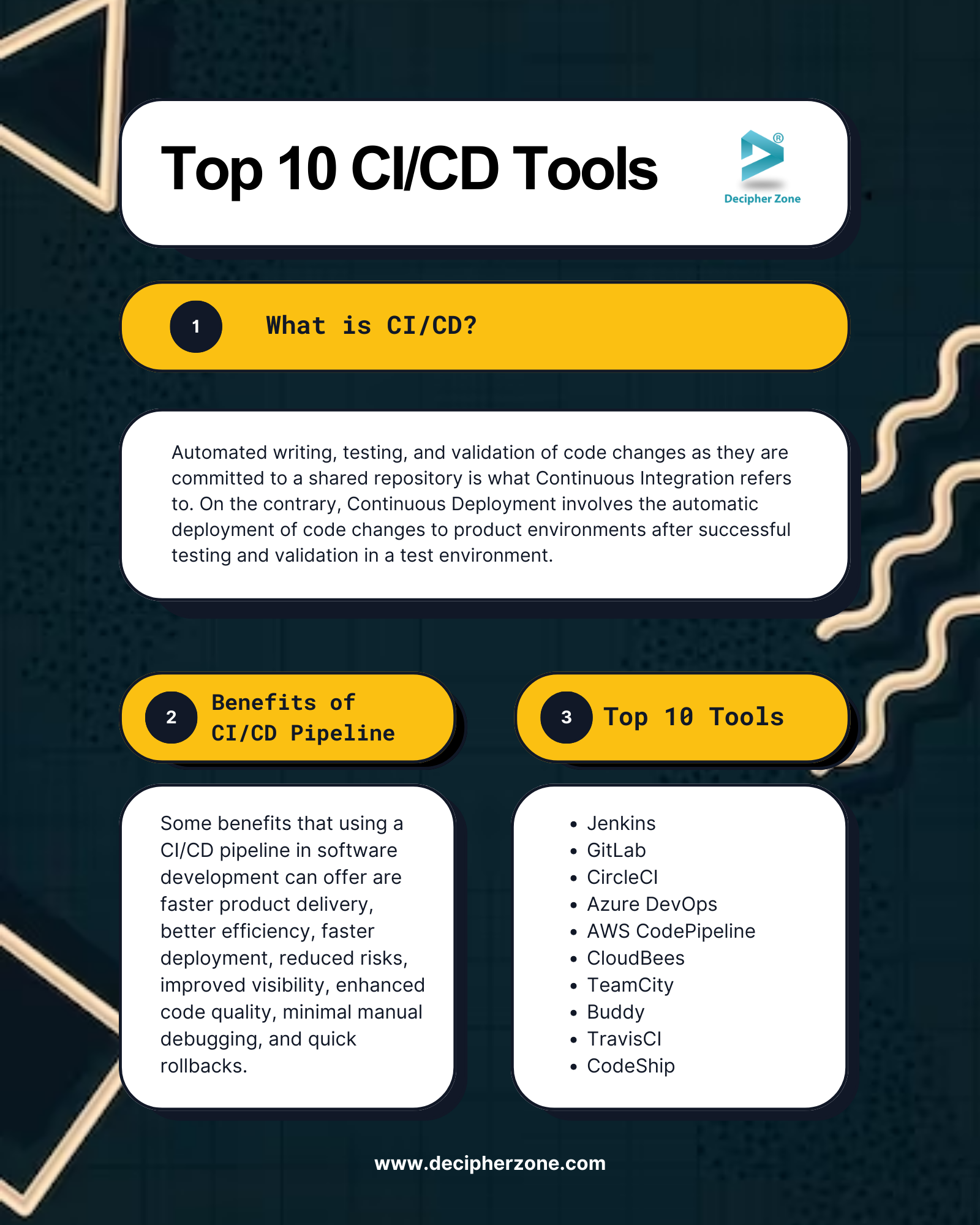Top 10 Best CI/CD Tools For DevOps and Programmers in 2024. Many businesses are now adopting Agile and DevOps methodologies for software development to ensure the delivery of high-quality end products in a shorter time.
The backbone of Agile and DevOps practices is continuous integration and deployment that allows development teams to collaborate, rapidly contribute updates, and merge the code in a shared environment. Without these practices, the process can be time-consuming and tedious.
In this blog post, we will explore the meaning of CI/CD and share the top 10 tools that can boost developers’ productivity when working with CI/CD pipelines.
Defining Continuous Integration and Continuous Deployment (CI/CD)
CI/CD are the integral software development practices that help developers deliver high-quality software more efficiently through automation.
While Continuous Integration defines the practice of automatically writing, testing, and validating changes made in code as they are committed to a shared repository, Continuous Deployment, on the other hand, automatically deploys code changes to product environments once it is successfully tested and validated in a test environment.
CI aims to catch errors early in the development process and prevent them from snowballing into larger issues that are difficult to fix. Continually integrating code changes allows developers to quickly identify and resolve conflicts, ensure application build success and run automated tests to ensure code is functioning properly.
Comparatively, Continuous Deployment focuses on automating the deployment process and reducing the risk of human error, which can lead to downtime or other production issues.
By continuously deploying code changes, developers can ensure that the latest version of the application is always available to end-users and that any bugs or issues are quickly identified and addressed.
Together, they form a powerful development pipeline that enables teams to focus on writing code and delivering features while ensuring that the application is always stable, secure, and up-to-date.
10 Best CI/CD Tools for DevOps and Programmers in 2024
With numerous CI/CD tools in the market, it can take time for developers to choose the ideal one for their project needs. Therefore, below are the top 10 CI/CD tools in 2024 that one can go for:
-
Jenkins
-
GitLab
-
CircleCI
-
Azure DevOps
-
AWS CodePipeline
-
CloudBees
-
TeamCity
-
Buddy
-
TravisCI
-
CodeShip
Let’s dive deeper into each one of these tools.
1. Jenkins
A self-contained, open-source, Java-based automation server with numerous plugins for continuous integration and deployment. It helps developers manage different software delivery stages like build, automated testing, documentation, static code analysis, and packaging.
Being server-based, Jenkins runs on servlet containers like Apache Tomcat. It supports various types of projects created through sbt, Apache Maven, Apache Ant, and arbitrary shell scripts.
Additionally, it can handle Windows batch commands and supports version control systems such as Git, ClearCase, AccuRev, Subversion, RTC, CVS, Perforce, and Mercurial.
Key Features:
-
Simple Integration and Installation
-
Open-Source Availability
-
Server-based Security
-
Hundreds of Plugins
-
Easy Distribution
-
Strong Community Support
-
User-Friendly Interface
-
Expression-Based Build Schedules
2. GitLab
GitLab CI is a software development tool that enables development teams to implement continuous integration (CI) and continuous delivery and deployment (CD) in the software lifecycle. It helps ensure that the code is free of bugs and errors, and adheres to coding standards and regulations.
Key Features:
-
AI-Powered Workflows
-
Source Code Management
-
Automated Software Delivery
-
Vulnerability and Dependency Management
-
Security and Compliance
-
Integrated Testing and Remediation
-
Value Stream Management
-
GitOps and Infrastructure as Code
3. CircleCI
It is a CI/CD tool with managed cloud services and self-hosting capabilities. It is served on-premises or as SaaS to automate software application builds, testing, and deployment. It allows development teams to reduce potential human errors by automating new commits testing suits.
Businesses can also meet security and compliance requirements by installing and managing CircleCI behind the firewall.
Key Features:
-
Unparalleled Security
-
Premium Support for DevOps professionals
-
Insights Dashboard
-
Clear Environments
-
Branch-Specific Configurations
-
Commands and Parameters
-
Conditional Step Execution
-
Docker Layer Caching Concurrency
4. Azure DevOps
Formerly known as Visual Studio Team Services, Azure DevOps refers to the tools and services used to manage production environments. It supports orchestration, automation, and service delivery management.
In Azure DevOps, continuous delivery is enabled by optimizing source control, building, testing, and release processes. Azure DevOps offers integrated features accessible through your browser or IDE client.
You can use all included services like Azure Pipelines, Azure Boards, Azure Test Plans, Azure Repos, and Azure Artifacts, or select what you need to complement existing workflows.
Key Features:
-
Container Deployment and Scaling
-
Event-Driven Serverless Code Processes
-
Interactive Set of Tools
-
Self-Hosted CI/CD Model
-
Package Management
-
Testing and Quality Assurance
-
Cloud-Hosted Private Git Repository Service
-
Several Pre-Defined Tasks
5. AWS CodePipeline
It is a continuous delivery service used to model, visualize, and automate software development and release processes. AWS CodePipeline can help speed up high-quality software delivery, automate release processes, establish consistent release processes, and provide real-time app status.
Not only that but it also offers seamless integration with third-party tools as well as other AWS services.
Key Features:
-
Built-in Artifacts Encryption
-
Automate Release Process
-
Supports Code Building, Compilation, and Testing
-
Improve Developer Output
-
Seamless AWS Integration
-
Pre-Built Plugins
-
Easy Access Control
-
Declarative Templates for New Pipelines

6. BuildBot
BuildBot is a job scheduling system built in Python that queues and runs jobs when resources become available. The system automates the compilation and testing cycles, verifying code changes and rebuilding and testing as necessary.
Key Features:
-
Supports Docker Images
-
Easy Setup and Installation
-
Ease of Managing BuildBot Master and Workers
-
Customized Features
-
Faster Delivery Speed
-
Build Extension Across Slave Platforms
-
Unrestricted Build Support
-
Quick Error and Issue Detection
7. TeamCity
It is a continuous integration and deployment software platform developed by JetBrains that promotes collaboration, flexible collaborations, workflows, and development processes. TeamCity’s scalability, seamless integration, and flexibility make it a prominent choice for complex software needs.
Key Features:
-
Integration with existing tools
-
Improve CI/CD Security
-
Easy User Management
-
Test Automation
-
Real-time Reporting
-
Pipeline Optimization
-
Configuration as Code
-
Cloud Integration
8. Buddy
Buddy is an automation tool that streamlines software development. It is used by the development team to build, test, and deploy application code from different repositories like BitBucket and Git.
Key Features:
-
Faster Builds, Tests, and Releases
-
Team Permissions
-
Free Docker Support
-
Script-Free Configuration
-
Over 20+ Dedicated Integrations
-
SSO and LDAP support
-
Dependency cache by defaults
-
FTP and SFTP Deployment
9. TravisCI
It is a CI service for building and testing software applications. In TravisCI, users can sign up, connect with repositories, build, and test with ease. It can be deployed with serverless or on-premises.
Travis CI used to offer free services to open-source projects but stopped in December 2020. TravisPro now provides custom deployments on customers' hardware.
Key Features:
-
Faster Setup
-
Support for Java, Julia, C#, and Python
-
Seamless Repository Integration
-
Pull Request Support
-
Pre-installed Database Services
-
Live Build Review
-
Clean VMs
-
iOS, macOS, and Linux Support
10. CodeShip
Codeship is a cloud-based software that assists in the effective implementation and enhancement of Continuous Integration (CI) and Continuous Deployment (CD). Its notable features comprise effortless integration with external tools, project dashboards, and intelligent notifications. Codeship is adaptable and can be integrated with any cloud, service, or tool to ensure uninterrupted workflow.
Key Features:
-
Performance and Security
-
Full Developer Autonomy
-
Easy Migration from Docker
-
Automated Software Releases
-
Easy Integration with Repositories
-
Notifications for Deployment Failures
-
Dedicated Instances
-
Centralized Team Management
FAQs: Top 10 Best CI/CD Tools
What does CI/CD mean?
Automated writing, testing, and validation of code changes as they are committed to a shared repository is what Continuous Integration refers to. On the contrary, Continuous Deployment involves the automatic deployment of code changes to product environments after successful testing and validation in a test environment.
What are the benefits of using the CI/CD pipeline?
Some benefits that using a CI/CD pipeline in software development can offer are faster product delivery, better efficiency, faster deployment, reduced risks, improved visibility, enhanced code quality, minimal manual debugging, and quick rollbacks.
What are the top CI/CD tools?
Jenkins, GitLab, CircleCI, Azure DevOps, AWS CodePipeline, CloudBees, TeamCity, Buddy, TravisCI, and CodeShip are the top tools used by developers to boost CI/CD pipeline productivity.

